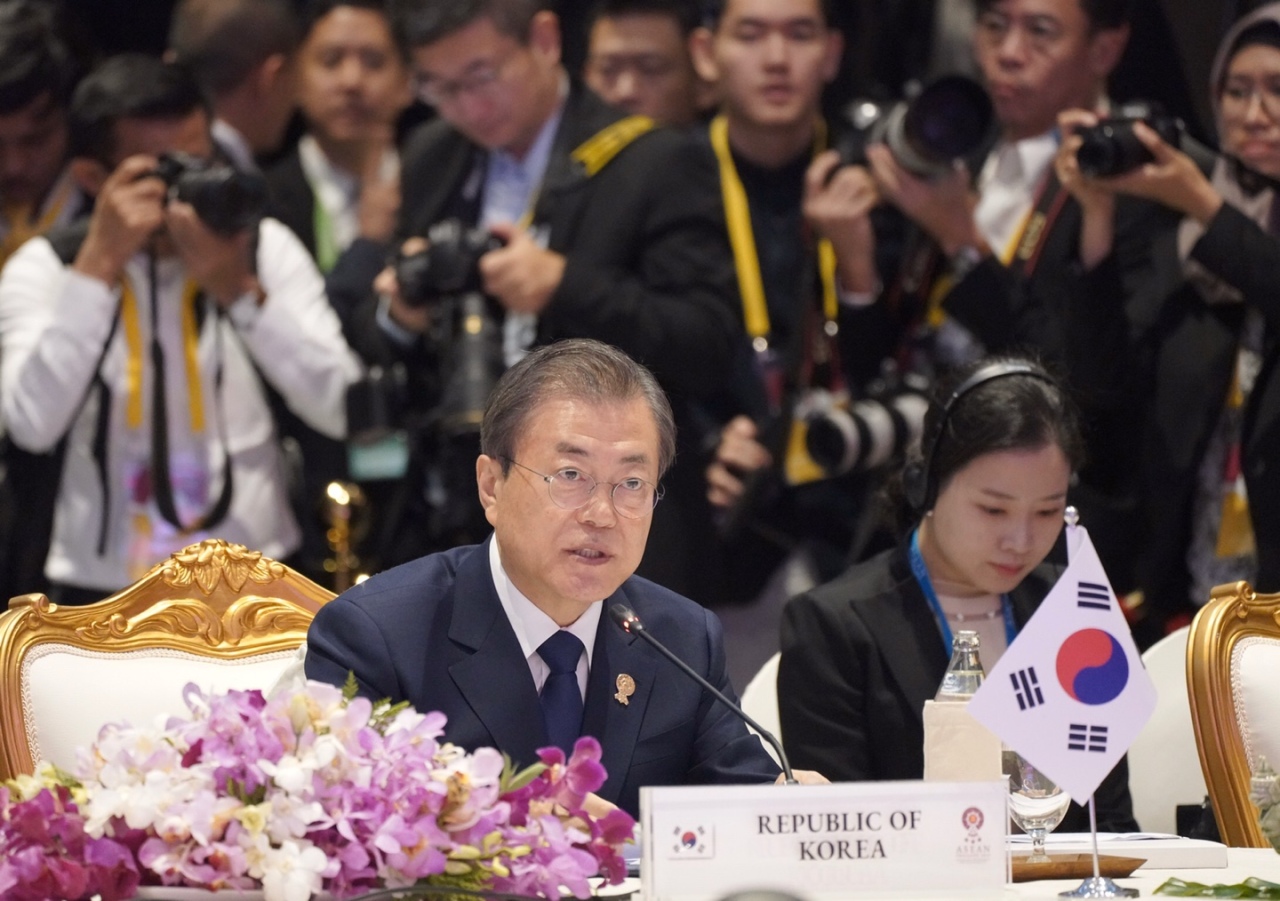Moon requests ASEAN's support for Korea peace process in Bangkok summit
By YonhapPublished : Nov. 4, 2019 - 12:30
South Korean President Moon Jae-in formally asked the ASEAN member states Monday to continue support for the slow-moving Korea peace process, saying North Korea and the United States are bracing for the most critical point in their related negotiations.
He was speaking at the end of the 22nd ASEAN Plus Three summit in Bangkok, joined by Japanese Prime Minister Shinzo Abe and Chinese Premier Li Keqiang.
Just ahead of the session, Moon talked separately with Abe for 11 minutes in a "very friendly and serious" mood, according to Cheong Wa Dae. It marked their first official one-on-one conversation since the New York talks held on the sidelines of the UN General Assembly meeting in September last year.
On the regional peace efforts, Moon said there has been a lot of progress thanks to ASEAN's support and cooperation.
"But it's not easy to resolve longtime confrontation and hostility," he said. "Fortunately, trust persists between the leaders of North Korea and the US and there's no change in their commitment to continued dialogue."
Working-level talks and a third summit between the two sides will be the "most critical moment" in the whole process toward the denuclearization of Korea and lasting peace, Moon said.

Once permanent peace is established, South Korea will contribute to peace and stability in both Northeast and Southeast Asia as a "bridge" linking continents and oceans, he added.
"The international community's support and cooperation is more needed than any other time," the president stressed.
Speaking at the outset of the annual APT forum, Moon raised the problem of protectionism and called for a concerted effort to safeguard free trade.
He recalled the birth of the APT gathering in December 1997, when Asia was hit by a financial crisis.
The ASEAN and the Northeast Asian powers were united to weather the crunch and created a "robust economic bloc" that now accounts for 30 percent of the world economy, Moon pointed out.
"Twenty years later, the wind of 'protectionism' is violent again," he said.
The president also expressed hope for an agreement in ongoing negotiations on the Regional Comprehensive Economic Partnership.
If signed, he added, it will contribute not only to the expansion of free trade and investment in the region but also to peace and co-prosperity in East Asia.
The RCEP talks began in 2012 between the ASEAN bloc and its dialogue partners: South Korea, China, Japan, India, Australia and New Zealand. They cover nearly half of the global economy.
In the closing statement, meanwhile, he also cited "supranational" challenges facing Asia, such as terrorism, climate change and disaster.
"The ASEAN Plus Three should exert leadership over issues, which are hard to resolve independently by a country," Moon said.
The ASEAN bloc has mapped out the APT Cooperation Work Plan 2018-2022, and South Korea has also taken part in the initiative.
Moon said South Korea will have a chance to follow up on related consultations with ASEAN in a special bilateral summit to take place in Busan later this month.
Moon and Abe had shunned formal one-on-one dialogue amid soured ties between the neighboring countries. In early July, Tokyo launched a retaliatory trade control against Seoul over a dispute dating back to Japan's 1910-45 colonization of Korea.
Moon then joined a special lunch on "sustainable development" along with the leaders of the other participating nations, as well as UN Secretary-General Antonio Guterres and Kristalina Georgieva, managing director of the International Monetary Fund.
He introduced South Korea's campaign for low-carbon growth with a road map for environmentally friendly energy and a hydrogen economy.
He vowed to broaden South Korea's ties with ASEAN on hydrogen economy, future cars, smart city, water management and infrastructure.
Moon noted that South Korea will host the second P4G summit in June next year. P4G stands for Partnering for Green Growth and the Global Goals 2030, a public-private initiative to tackle climate change and other sustainable development challenges.
Subsequently, Moon attended the East Asia Summit session involving the ASEAN members, South Korea, Japan, China, the US, Russia, Australia, India and New Zealand. It was first held in 2005.
He requested backing for his offer, made in his United Nations speech in September, to turn the Demilitarized Zone into an international peace zone.
A separate RCEP summit is set to open soon, with the host Thailand pushing for a deal to conclude the negotiations that started in 2012. Even if an agreement is reached, reportedly, it will likely be formally signed later on as some member countries need to carry out relevant domestic procedures. (Yonhap)



![[Herald Interview] 'Amid aging population, Korea to invite more young professionals from overseas'](http://res.heraldm.com/phpwas/restmb_idxmake.php?idx=644&simg=/content/image/2024/04/24/20240424050844_0.jpg&u=20240424200058)













![[KH Explains] Korean shipbuilding stocks rally: Real growth or bubble?](http://res.heraldm.com/phpwas/restmb_idxmake.php?idx=652&simg=/content/image/2024/04/25/20240425050656_0.jpg&u=)

